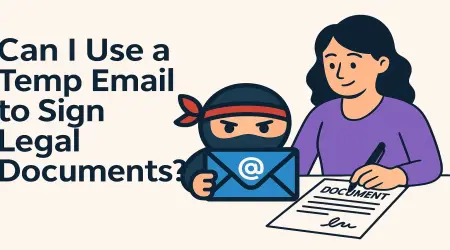

Can I Use a Temp Email to Sign Legal Documents?
In today’s world, where privacy feels harder to come by, it’s understandable that people ask, “Can I just use a temp email to sign legal documents?” What is it? You can actually not, and here is how it is going to be important when you are communicating with lawyers, divorce lawyers or any legal documents.
So, What Exactly Is a Temp Email Ninja?
A temporary email, also known by the term burner email, is exactly what it sounds like: an email address that you can create and in many cases discard after relatively little time. They become fantastic ways to avoid spam or unnecessary newsletters, but the benefit quickly turns into drawback when legally binding papers call upon a review of the paper trail.
Legal Doc contains More Than a Working Inbox
Just like in legal proceedings, communication means everything but even in the legal system, communication must be dependable, documented and provable. When you sign something legally, be it a divorce petition, a contract or any form of activity involving lawyers then this needs to be traceable.
Here’s where temp emails fall short:
✅ No real ownership – Anyone could gain access if they know the address.
✅ Little to no identity verification – Most legal platforms and divorce lawyers require you to prove who you are.
✅ Poor long-term access – These emails expire. That means missed court dates, filing updates, or even loss of legal proof.
What the Law Experts or Divorce Attorneys Really Believe
It is not debatable that reliable communication is essential, and any attorney who has been in the business long will tell you the same thing.
It is the expectation of most lawyers, particularly those in divorce, to:
- Have a valid email address that she checks
- Be available in case of an emergency case.
- Keep a record of communications that can at least be argued to court.
Other law firms even decline to take up clients who give out only temporary contact details. It is just not worth it, risks are too high, both ways.
The Risks of Using Temp Email for Legal Matters
An example will be walked through. Let us assume that you are initiating a divorce. You contact a divorce lawyer using a temp email. They will send you a retainer agreement You sign it A couple of days after, that temporary inbox is gone.
Now you’ve lost:
Proof of that agreement.
A way for your lawyer to reach you.
Access to critical updates or court documents.
That one misstep could cause delays, missed deadlines, or worse—legal consequences.
Other potential issues with temp email in legal work include:
📉 Loss of important data (once the inbox is gone, it's gone).
⚠️ Weak security—most don’t use passwords or encryption.
❌ Violations of laws around digital signatures and verified communication.
Are There Times When Temp Emails Make Sense?
The short answer is yes, but in certain cases.
Temp emails might be useful if you’re:
Signing up for a lawyer directory or a free consultation.
Downloading a legal checklist or guide that requires your email.
Just browsing anonymously to get a feel for the process.
But once you decide to move forward and actually work with a lawyer, especially a divorce lawyer, it’s essential to use a permanent, secure email address.
Alternatives That Are Better and At The Same Time, Protect Your Privacy
Do you feel embarrassed to handover your primary email? It is not you alone. These are superior alternatives to privacy versus professionalism:
- Get a separate Gmail account to use on legal issues only- then you can check such to see what is going on and it can be independent of personal problems.
- Use an encrypted tool such as tempmail44 Work, available all-time security, as well as durability.
- Use client portals access- The use of online portals offered by the law firms is centralizing and coded.
- Ask your lawyer- A qualified lawyer will not mind advising you to adopt a safe and reliable means of contacting each other.
Why Legal Signing Platforms Require Real Emails
Digital signing platforms—like DocuSign, HelloSign, and Adobe Sign—don’t just collect your signature. They often log:
Your full name and IP address
Time and date of the signature
Verified, functioning email addresses
Trying to use a temp email on one of these platforms could backfire. It might cause the document to be rejected or legally questioned—putting your lawyer, or your divorce lawyer, in a difficult position.
Can Divorce Lawyers Accept Temp Emails?
At first glance, sure—your initial message might come from a temporary email. But any meaningful legal engagement will involve:
Verified ID (usually government-issued)
A real email address for record-keeping
Payment or billing info tied to your identity
So while it might be fine for that first contact, it won’t get you very far in an actual legal case.
Bottom Line: Privacy Matters, But So Does Accountability
Let’s be honest: temporary emails are convenient. They help you stay off marketing lists and give you some peace of mind online. But when it comes to signing legal documents or working with lawyers, they just don’t provide the kind of reliability and traceability the legal system demands.
Final Thought:
Use a temp email to browse or explore. But once you’re engaging with a lawyer or signing real paperwork, switch to a secure, permanent email you trust—and check regularly.